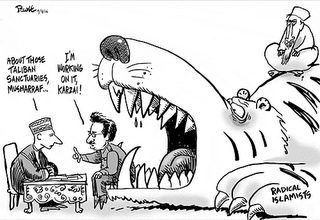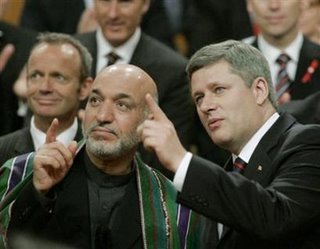
Pamela's reporting boggles the mind she continues to produce article after article that is completely devoid of any connection to reality. Forget investigative reporting, does she even bother reading the local papers, or for that matter even the US press and her own paper?
Her analysis here - is that the lack of progress in Afghanistan in spite of the massive amounts of money being pumped in is largely due to corruption and inefficiency in the Karzai government. There are two problems with her conclusion.
- Its widely acknowledged that promised aid to Afghanistan by the US and the west never really materialized. Only half the money pledged materialized and an unreasonably large proportion of that has had to be diverted to military uses because of Taliban attacks. Furthermore around three-quarters of foreign aid is channeled outside the government's own budget, presenting a serious constraint to the country's long-term fiscal planning. And it appears the the promises made to fund the reconstruction are all but forgotten.
- Taliban attacks have seriously limited the Karzai governments to a small region around Kabul.
She does quote unnamed "Afghan officials" who "have repeatedly accused neighboring Pakistan of allowing Taliban insurgents to find refuge in the border region." She herself of course, has no such accusations for Pakistan. Pamela must be the only person living in that area who does not believe that Pakistan is cynically aiding the Taliban and pressuring Afghanistan. Talk of corruption and bias!

------ article full text ---------
Afghan Experiment Marked by Progress And Disillusionment
By Pamela Constable
Washington Post Foreign Service
Monday, September 11, 2006; A09
KARABAGH, Afghanistan -- When Mahmad Naib ventured back to his village, north of Kabul, after U.S. warplanes and Afghan fighters drove out the Taliban militia in November 2001, he found little but scorched earth. The grapevines were dead, the houses looted, the mosque in ruins and the magnificent sycamores burned black.
Today, the resettled mud-and-timber village is surrounded by ripening grapes and obscured by a thicket of new restaurants, workshops and gas stations lining the nearby Shomali highway. The roar of fast traffic drowns out the ping of hammers as workers erect a shiny tin dome on the half-restored village mosque.
"Life is hard, but it is peaceful, and that is what matters most," said Naib, 55, a mason who was shoveling debris Thursday out of the newly plastered mosque. "We do have our complaints. Wages are low, water is scarce, and the government never dug the wells it promised. But . . . by God's grace, we will finish this mosque in time for Ramadan."
One day after he spoke, a massive car bombing killed 16 people in Kabul, the capital, 30 miles to the south. The brazen midday attack underscored the fragility of peace in Afghanistan today, nearly five years after the overthrow of the Taliban rulers who imposed an extreme form of Islam and harbored Osama bin Laden.
Since late 2001, the country of 25 million people has undergone an ambitious experiment, backed by international troops, expertise and aid, to bring modern democracy to an impoverished, deeply conservative Muslim society.
On some levels, there has been remarkable progress: presidential and parliamentary elections, a new constitution, a new national army and greater freedoms for women. In poor but stable communities such as Karabagh, halting social and economic gains have been made: a part-time nurse in a clinic, carpets in a school where students once crouched on concrete, a grape harvest that is approaching half the pre-Taliban crop.
But in the southern provinces that spawned the Taliban movement, open warfare has resumed after four years of relative quiet. Insurgents are battling NATO troops and employing suicide bombs. Thousands of villagers have fled their homes, to escape both insurgent violence and NATO airstrikes. Schools have shut down, and development projects have stopped.
At the same time, opium poppy cultivation, virtually wiped out by the Taliban, has soared to record levels, largely in the south. Nationwide it increased by 59 percent in the past year alone, according to new U.N. figures. Drug traffickers have formed protective alliances with the Islamic insurgents.
"The situation in the south is difficult and fragile," said Mark Laity, a spokesman here for NATO forces. "We are conducting a number of offensives, but the Taliban have also been pushing hard. They are taking heavy casualties but standing their ground more. Our strategy is still to create secure spaces for development and governance, but the effort is taking longer and involving a lot more combat than expected."
NATO's commanding general, citing the surprising toughness of the insurgents, called last week on member nations to provide as many as 2,500 additional troops for the south. But the proposal faces questions in European capitals about the risks involved. Since taking responsibility for the south from U.S.-led forces at the beginning of August, NATO has lost 35 troops.
Senior Taliban leaders and al-Qaeda figures, including bin Laden, who is widely believed to be hiding in the wilds along the Afghan-Pakistani border, meanwhile continue to elude capture. Afghan officials have repeatedly accused neighboring Pakistan of allowing Taliban insurgents to find refuge in the border region.
In recent months, the violence has spread to the Kabul area and the east, creating a sense of insecurity that now overshadows all other national concerns. Even in the north and west, where the insurgency has hardly reached, many people today express dismay with the government of President Hamid Karzai. They say it remains weak and distant, that public services and protection are grossly inadequate, and that commanders from the war against Soviet troops in the 1980s often hold extortionate sway over daily life.
Foreign analysts and domestic critics point to a daunting list of social, economic and institutional problems that Karzai's government has largely failed to correct despite massive aid and training from abroad: impassable roads, ineffective courts, too few doctors, too few police officers. Complaints of corruption are constant, taking a huge toll on public confidence in the system.
"We have had some big successes -- the development of media, the parliamentary and presidential elections. But real successes that people can feel in their daily lives? Honestly, there is nothing," said Shukria Barakzai, 34, a member of parliament from Kabul. "Poppy is booming, but farmers are still poor. Good jobs are available, but only for the few with computer and English skills. Clinics are open, but anyone with a serious illness has to go to Pakistan for treatment."
For the first four years after Karzai came to office in late 2001, such harsh criticism was rare. The influx of foreign support -- more than $3.5 billion in U.S. economic aid alone -- brought a sense of progress. More than 6 million children were enrolled in schools; crews built a new highway between the two major cities, Kabul and Kandahar; and the economy grew at a brisk 15 percent a year.
But the high expectations that democracy would deliver jobs and development has gradually turned to bitter disappointment as reports of corruption spread and the massive doses of foreign aid seemed to produce few tangible benefits for the poor.
Kabul, the capital of 3.5 million, did acquire a veneer of commercial and social progress. Dozens of glittering office buildings and wedding salons opened; ATMs whirred and cellphones buzzed. But many neighborhoods remained without electricity and water, and urban poverty exploded with the massive return of war refugees. A major riot in late May revealed both the depth of public frustration and the failure of police protection.
Ethnic tensions deepened despite foreign efforts to craft a government in which major ethnic groups shared power.
Many Afghan Muslims also began to equate modernization with immorality. They mistrusted the emancipation of women enshrined in the new charter and disapproved of Kabul restaurants selling alcohol to foreigners. Earlier this year, an Afghan man was nearly sentenced to death for converting to Christianity.
The strong initial welcome for U.S. and other foreign troops in the country also began to chill. There were complaints about airstrikes on village compounds that killed civilians. As the insurgency erupted this year, with more firefights and bombings in civilian areas, Afghans began blaming the foreign soldiers for exposing them to danger.
"We don't want these troops patrolling here, because it only brings trouble and kills innocent people," said Akbar, a 54-year-old teacher standing beside the Kabul boulevard where a suicide bomber attacked a NATO patrol last week, killing at least three bystanders. "We were happy when the Taliban fell and the new government came, because we thought it would bring peace and development," he said. "Now the people are not starving, but with all these deaths and bombs, it seems like the Taliban time was better."
Afghan officials acknowledge that legal and democratic institutions are still weak, but they point to recent improvements such as the appointments of better-qualified Supreme Court justices and an anti-corruption commission. Human rights activists said they were encouraged by these changes but concerned that they would not trickle down to rural regions.
"We have built institutions and elected legitimate leaders . . . but in much of the country, there is no government at all, just empty locked offices," said Ahmad Nader Nadery of the Afghanistan Independent Human Rights Commission. As a result, he said, some communities are beginning to accept the Taliban, and others are turning to local militias.
With the insurgents exploiting government weaknesses and public frustrations, a variety of experts have warned that the achievements of the past five years -- and even the stability of the Afghan government -- could be in serious jeopardy.
Barnett R. Rubin, an American expert on Afghanistan, conducted a broad survey here last month. In a resulting report, "Still Ours to Lose: Afghanistan on the Brink," sponsored by the Council on Foreign Relations, he wrote that many Afghans had lost faith in the Karzai government and that some felt conditions in the country were "ripe for fundamentalism."
Salvaging the situation, Rubin wrote, will require a major increase and redirection in foreign aid, serious reforms in the justice and police systems, and the shutting down of Taliban support networks in neighboring Pakistan -- none of which seems likely to happen in the near future.
In Karabagh, the Taliban threat still seems far away. Schools are full, tourist shops are stocked with local pottery, smoking kilns bake mountains of construction bricks, and cargo trucks haul away crate after crate of grapes.
But even here, people here are beginning to voice the disillusionment and anxiety expressed by Afghans in more troubled regions. They complain that local officials, linked to former militia commanders, demand shares of their crop profits, bridal dowries and rationed irrigation water.
"Everyone knows the money goes into certain pockets, but at least we can walk down the road without fear," said Naimullah, 40, who was picking grapes on a rented plot Thursday with his wife, brother and four children. "I heard about the Taliban trying to come back, but no one in Afghanistan wants more fighting and killing," he said. "We have come home, so we must plant our crops and see what they produce."
 Character assassination by photo selection
Character assassination by photo selection


